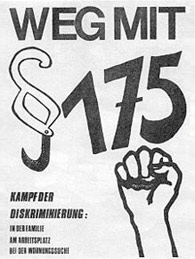Same-sex erotic relationships are as old as humanity, but our modern understanding of what it means to be homosexual – and the earliest gay rights movement – started in nineteenth-century Germany, according to an article by historian Robert Beachy from Goucher College in Baltimore, Maryland, US.

The article, The German Invention of Homosexuality, which is published in a recent issue of The Journal of Modern History, summarises his forthcoming book, Gay Berlin: Birthplace of a Modern Identity, which is due out next year.
According to Beachy, modern conceptions of homosexuality began, ironically, with an anti-sodomy law. When the German empire was unified in 1871, the Imperial Criminal Code included a law prohibiting sexual penetration of one man by another. Questions about what types of activity should fall under the law spurred a sustained public inquiry into the nature of same-sex eroticism and sexuality in general.
"As such, [the law] created the all-important context and stimulant for the evolution of the world's most expansive science of homosexuality," Beachy writes. And from that science emerged key components of the modern view of homosexuality, including "the understanding of erotic same-sex attraction as a fundamental element of the individual's biological or psychological makeup," Beachy explains.
This new view of same-sex love was pioneered by German doctors who published early case studies of homosexuals in the 1850s. German psychiatrist Richard von Krafft-Ebing released the first edition of his hugely influential Psychopathia Sexualis in 1886, which included multiple case studies of homosexuals that supported this new position. Through his work, Krafft-Ebing became a vocal opponent of the German anti-sodomy law, stating that homosexuality "should not be viewed as a psychic depravity or even sickness."

A remarkably free German press enabled these ideas to spread outside the scientific literature into popular books and encyclopedias, Beachy says. "The encyclopedia entries suggested directly or implicitly that same-sex eroticism was a naturally occurring if uncommon phenomenon that affected a small percentage of the general population," he writes. "The love that dared not speak its name, as Oscar Wilde put it, had many names, at least in German."
It was also during this time that world's first political organization advocating gay rights, the Scientific-Humanitarian Committee (Wissenschaftlich-humanitäres Komitee, or WhK), was formed. The WhK undertook a massive effort to reform the anti-sodomy law, mailing "enlightenment brochures" to thousands of politicians, religious leaders, doctors, and teachers and collecting thousands of signatures on petitions opposing the law.
The movement ultimately failed to dislodge the law, and German scientific inquiry into sexuality came to an abrupt end with the rise of the Nazis in the 1930s. Nevertheless, Beachy argues, it was that law – and the inquiry and activism it inspired – that helped the modern understanding of homosexuality to take root.
Press release from University of Chicago Press Journals
For subsequent parts, click here.











 Printable Version
Printable Version











Reader's Comments
See
http://en.wikipedia.org/wiki/Magnus_Hirschfeld
http://www.schwulesmuseum.de/
http://www.hirschfeld.in-berlin.de/index.html
Please log in to use this feature.